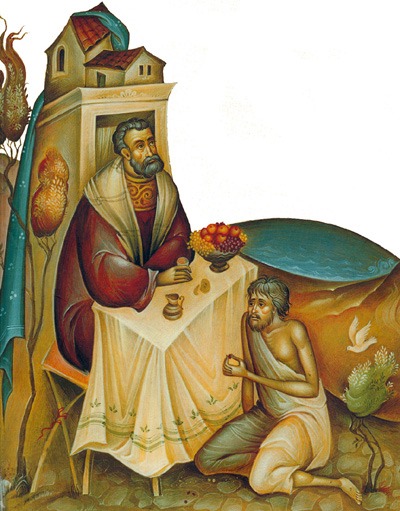Rector's Reflection: Your One Wild And Precious Life, September 27, 2025
- Sep 27, 2025
- 3 min read

Beloved Members of St. Martin's,
For several weeks now, we have been hearing some very direct gospel readings to let us know how Jesus feels about those who control vast amounts of wealth. After last week's frustratingly Zen koan of a parable that seems to (but actually does not, to be clear) praise dishonesty, we get this week's parable of the Rich Man and Lazarus.
In our gospel fable of the rich man and the beggar at his gate, Jesus symbolically condemns those who do not use their means to care for those less fortunate. The difference between the two symbolic characters Jesus creates in Luke 16 could not be more stark-- nor could we miss the signs of whose side Jesus is on. Each day the rich man averts his eyes from the beggar, beset by open sores, at his very own gates, as he goes about preparing his daily feasts. The rich man is nameless, but the poor man is named "Lazarus," meaning "God Is My Helper." Yet, from our perspective, we hear the name "Lazarus" and think of Jesus's friend whom Jesus raised from the dead.
Speaking of death, the one thing both men share is that they are mortal. When both die, there is a stark reversal of circumstance. Suddenly, and for eternity, the beggar is in the bosom of Abraham in ease and honor (recalling Jesus's observation from August 31 about humility in choosing places of honor), while the rich man is in torment. The rich man reinforces why he is in torment with his continued attitudes that Lazarus should serve him, as the rich man tries to convince Abraham-- from Hades-- to make Lazarus tend to soothe his suffering or become an errand boy to warn the rich man's brothers of what fate awaits them if they ignore the divinely sanctioned claims of those in need all around them.
Yet is this a story about death-- or about life? I think we DO miss the point if we think following Jesus is about taking care of ourselves and "going to heaven" after we die matters more than how we try to live like Jesus. Whether we believe in heaven or hell-- or Hades-- or not, the fact is that what we do with our lives matters, and how we respond to the human needs and suffering we know exist all around us-- is what matters.
How we recognize the divine image in everyone-- rich or poor, saint or sinner, citizen or migrant, even friend or foe-- matters. It matters because the most important part of the life of faith is not in what we believe, but in what we do when that belief takes root within us, in all its implications. At the heart of the life of following Jesus, not just "believing" in him, is the concrete and mindful ways we truly seek to live in unity with each other, regardless of race, class, origin, or wealth-- and especially, for the way we care for the "invisible" ones lying at our very gates.
In her poem, The Summer Day," Mary Oliver famously asked, "Tell me, what is it you plan to do with your one wild and precious life?" Jesus asks us that question every day. Every day is a day to work toward recognizing the mercy and grace God offers us, and let that mercy and grace come to full flower in the way we use what is most precious in this world for the benefit of those most ignored and forgotten. This is the path of life, abundant for all, which God first gives each of us.
In Christ,
Mother Leslie+